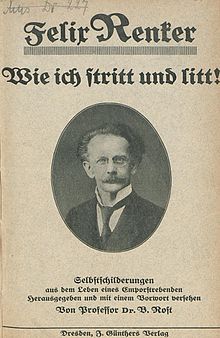Felix Renker
Felix Renker (born December 2, 1867 in Leipzig , † March 8, 1935 in Dresden ) was a German playwright .
Life
Felix Renker was at the age of six years, an orphan and was raised by foster parents and the orphanage on. He learned the trade of bookbinder , developing a growing interest in literature during the last years of his apprenticeship . After completing his apprenticeship, Renker went on a journey in 1886 , but returned to Leipzig early to take up a position at the Franz Karrer publishing house. In 1888, Renker married just before he turned 21.
Renker wrote poems and other works that were rejected by all publishers; because of his too small height, he also found no opportunity to appear as an actor . A social association in Lausigk finally gave him the opportunity to lead theatrical performances , which gave Renker his first practical experience with the stage. When buying theater pieces , he came into contact with the Otto Teich publishing house , which accepted his first work.
Since he had meanwhile lost his job, Renker was henceforth mainly active as a writer in order to provide for his family of five. In 1894, when more than a hundred works by him had already been published, he found a new job as a foreman in the Dresden paper goods factory Paul Suss, where he also wrote texts for greeting cards. He started a theater group made up of factory workers and later founded an all-male theater ensemble that went on tour under his direction . He also published the magazine Der Theaterfreund , for which he himself contributed numerous articles under the pseudonym Herbert Wolter . During the First World War he appeared in the stage adaptation of Wilhelm Busch's Hans Huckebein in hospitals .
Felix Renker died in 1935 and was buried in the presence of a large number of actors in the Striesener Friedhof in Dresden.
plant
Total wrote Renker about 400 works of various kinds, including 16 dramatic plays, 11 folk plays, 43 comedies and three operettas as well as numerous smaller pieces, songs, couplets and scenes. In particular, the many humorous short works of all kinds were widely distributed, as they were sold in large numbers by festival merchants and performed or recited by the participants at festivals.
In addition to his own name, Renker used a number of pseudonyms for his works: Satyrikus, Herbert Wolter, Walter Freimut, August Schulze, Max Rudolph, Erich Frohherz, Fidelio, P. Martini, Erich Krätzer, Max Grubert, Fritz Winkler, Dr. Schulrat, Anna Herz and Dr. Paul heritage.
literature
- Felix Renker: How I fought and suffered! Self-portrayals from the life of an aspiring man . J. Günthers Verlag, Dresden 1917
- Short biography at the University of Graz
- Ilse Wolfram: 200 years of folk hero Andreas Hofer on stage and in film . Herbert Utz Verlag, 2010. ISBN 3-8316-0932-2
- Wilhelm Widenmann (Hg.): Catalog about cotillon, ball & joke articles of the festive mail order company JC Schmidt, Erfurt, 1911 (reprint). Georg Olms Verlag, 1999. ISBN 3-487-41563-1
- Theater guide. Successful plays, operettas, singing games, humoristics. (Catalog of the available text books, partly with table of contents): Teich, Otto u. Siber, Carl u. a. (Ed.): M. Illustr. Leipzig, Teich, undated (approx. 1925). 97 pp.
Individual evidence
- ↑ Listed numerous cheerful one-act play, men's one-act play, sports stage, fire brigade stage, ladies one-act play, fairytale stage, Christmas plays, serious one-act Multi-act, couplets, etc. by Hans Berger, Fritz Stein, Fritz Dix, Paul Malek, Felix Renker, Rudolf Schmidt, Herbert Wolter, Georg Mielke, Max Grubert, Gert Truska, Otto Böttinger, Paul Meder, Ludwig Blau, Luise Sauer, Paul Preil , Martin Loewe, Otto Reutter u. v. a.
| personal data | |
|---|---|
| SURNAME | Renker, Felix |
| ALTERNATIVE NAMES | Satyric; Herbert Wolter; Walter Freimut; August Schulze; Max Rudolph; Erich Frohherz; Fidelio; P. Martini; Erich Krätzer; Max Grubert; Fritz Winkler; Dr. School council; Anna heart; Dr. Paul heritage |
| BRIEF DESCRIPTION | German playwright |
| DATE OF BIRTH | December 2, 1867 |
| PLACE OF BIRTH | Leipzig |
| DATE OF DEATH | March 8, 1935 |
| Place of death | Dresden |
